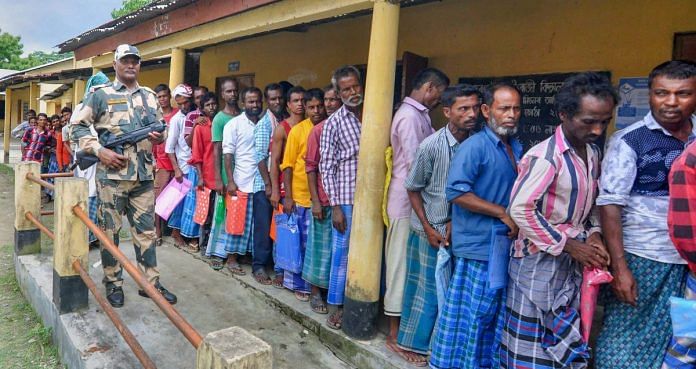JPC has upheld most of the provisions in the bill, which has become a political and social flashpoint, given the backdrop of the NRC process in Assam.
New Delhi: The Joint Parliamentary Committee, set up to look into the contentious Citizenship (Amendment) Bill, 2016, submitted its report Monday, upholding most of its provisions.
The bill – aggressively pushed by the BJP-led government – has become a political and social flashpoint, particularly in the backdrop of the National Register of Citizens (NRC) being updated in Assam. The BJP’s allies like the Shiv Sena, Janata Dal (United), as well as the Asom Gana Parishad (AGP) in Assam, have staunchly opposed it.
Also read: NRC process in next 6 months crucial for 32 lakh people in Assam, and for BJP’s poll agenda
The bill & opposition to it
The NDA government introduced the bill in the Lok Sabha on 19 July 2016 – the aim was to amend the Citizenship Act, 1955. The bill made illegal migrants — Hindus, Sikhs, Buddhists, Jains, Parsis and Christians — from Afghanistan, Bangladesh and Pakistan eligible for Indian citizenship.
Opposition to the bill is based on several factors.
One, the bill seeks gives preference of citizenship on the basis of religion — that goes against the tenets of the Constitution, given that Article 14 guarantees the right to equality.
Two, it goes against the provisions of the 1985 Assam Accord as well as the sentiments of the indigenous Assamese people who have been opposed to all immigrants, irrespective of religion.
Three, it is seen as the BJP’s way push forward its majoritarian, Hindutva agenda as it comes right in the middle of the NRC updating exercise that aims to identify illegal immigrants from Bangladesh in Assam.
Also read: NRC may cost 30 lakh people their right to vote, officials say
How it feeds into NRC
The purpose of NRC is to identify those people who immigrated, illegally, from Bangladesh to Assam after 24 March 1971. If the Citizenship (Amendment) Bill is passed and Hindu immigrants are granted citizenship, it would mean Muslims are being specifically targeted through NRC.
For the ethnic Assamese, it would render NRC redundant since their opposition has been to all “outsiders”, irrespective of religion. Updating the NRC list – as provided for by the Assam Accord – was meant to identify all illegal immigrants whom the Assamese people felt have eaten into their limited resources. The Assamese now feel this bill – giving citizenship to non-Muslim immigrants from Bangladesh – will make a large section of illegal immigrants claimants to the state’s resources.
BJP’s politics of the bill
The BJP has been talking about the Citizenship (Amendment) Bill and identifying illegal Bangladeshi immigrants through the NRC process in the same breath.
The bill is crucial to the BJP so it can claim to have delivered on the Hindutva front, at least on one count. This bill combined with NRC and Ayodhya’s Ram temple issue are key tenets of the BJP government’s promises to its core vote base and cadres, and the party wants to be seen as pushing it ardently
The urgency within the BJP’s on the bill is evident in how its top leaders have upped the ante on the matter. Just last week, at a rally in Silchar in Assam, Prime Minister Narendra Modi declared his government’s intention of bringing in the bill, and said it would “correct the mistakes made during Partition”.
On Sunday, senior Assam minister and BJP leader Himanta Biswa Sarma said if the Citizenship bill isn’t brought in, “at least 17 assembly seats will go to Jinnahs”.




It would take the apex court thirty seconds to strike down the discrimination against Muslims vis a vis people belonging to other faiths. The provision goes to the heart of the question – also one of the basic features of the Constitution that cannot be changed – Is India a secular state or a Hindu Rashtra ? 2. There is so much solid, constructive work any government can do over a period of five years. Are these two or three peripheral issues, which do not put an omelette on an Indian child’s breakfast plate, all that could be rustled up from the larder ?